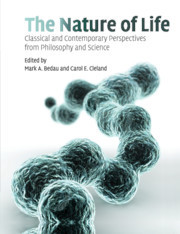Description
The Nature of Life
Classical and Contemporary Perspectives from Philosophy and Science
Authors: Bedau Mark A., Cleland Carol E.
Introduces a broad range of scientific and philosophical issues about life through the original historical and contemporary sources.
Language: English
Subject for The Nature of Life:
Approximative price 34.17 €
In Print (Delivery period: 14 days).
Add to cart
The Nature of Life
Publication date: 11-2018
440 p. · 19x25 cm · Paperback
Publication date: 11-2018
440 p. · 19x25 cm · Paperback
Approximative price 143.25 €
In Print (Delivery period: 14 days).
Add to cart
The nature of life: classic and contemporary perspectives from philosophy and science
Publication date: 09-2010
440 p. · 19.4x25.3 cm · Hardback
Publication date: 09-2010
440 p. · 19.4x25.3 cm · Hardback
Description
/li>Contents
/li>Biography
/li>
Bringing together the latest scientific advances and some of the most enduring subtle philosophical puzzles and problems, this book collects original historical and contemporary sources to explore the wide range of issues surrounding the nature of life. Selections ranging from Aristotle and Descartes to Sagan and Dawkins are organised around four broad themes covering classical discussions of life, the origins and extent of natural life, contemporary artificial life creations and the definition and meaning of 'life' in its most general form. Each section is preceded by an extensive introduction connecting the various ideas discussed in individual chapters and providing helpful background material for understanding them. With its interdisciplinary perspective, this fascinating collection is essential reading for scientists and philosophers interested in astrobiology, synthetic biology and the philosophy of life.
Preface; Acknowledgments; Sources; About the authors; Introduction; Part I. Classical Discussions of Life: 1. De Anima (selections) Aristotle; 2. Treatise on Man René Descartes; 3. Critique of the Teleological Power of Judgment (selections) Immanuel Kant; 4. What is Life? (selections) Erwin Schrödinger; 5. The nature of life Alexander Oparin; 6. What is the meaning of 'life'? Ernst Mayr; 7. The Principles of Life (selections) Tibor Gánti; Part II. The Origin and Extent of Natural Life: 8. The origin of life: a review of facts and speculation Leslie E. Orgel; 9. Small molecule interactions were central to the origin of life Robert Shapiro; 10. Are the different hypotheses on the emergence of life as different as they seem? Iris Fry; 11. The universal nature of biochemistry Norman Pace; 12. Is there a common chemical model for life in the universe? Steven A. Benner, Alonso Ricardo and Matthew A. Carrigan; 13. Searching for life in the universe: lessons from Earth Kenneth H. Nealson; 14. The possibility of alternative microbial life on Earth Carol E. Cleland and Shelley D. Copley; 15. Introduction to the limits of organic life in planetary systems National Research Council of the National Academies; Part III. Artificial Life and Synthetic Biology: 16. Learning from functionalism: prospects for strong artificial life Elliott Sober; 17. Life, 'artificial life', and scientific explanation Marc Lange; 18. Alien life: how would we know? Margaret A. Boden; 19. Automatic design and manufacture of robotic life forms Hod Lipson and Jordan P. Pollack; 20. A giant step towards artificial life? David Deamer; 21. Approaches to semi-synthetic minimal cells: a review Pier Luigi Luisi, Francesca Ferri and Pasquale Stano; 22. Creating 'real life' Evelyn Fox Keller; Part IV. Defining and Explaining Life: 23. Definitions of life Carl Sagan; 24. The seven pillars of life Daniel E. Koshland; 25. A universal definition of life: autonomy and open-ended evolution Kepa Ruiz-Mirazo, Juli Pereto and Alvaro Moreno; 26. Does 'life' have a definition? Carol Cleland and Christopher Chyba; 27. Sentient symphony Lynn Margulis and Dorion Sagan; 28. Defining life Kim Sterelny and Paul Griffiths; 29. Universal Darwinism Richard Dawkins; 30. What is life? Was Schrödinger right? Stuart A. Kauffman; 31. Four puzzles about life Mark A. Bedau; Supplemental bibliography on life; Index.
Mark A. Bedau is Professor of Philosophy and Humanities at Reed College, Oregon and a regular Visiting Professor at the European School of Molecular Medicine, in Milan, Italy. He is an internationally recognized leader in the philosophical and scientific study of living systems and has published and lectured extensively on issues concerning emergence, evolution, life, mind, and the social and ethical implications of creating life from nonliving materials.
Carol E. Cleland is Professor of Philosophy at the University of Colorado (Boulder). She is a central figure in the emerging science of astrobiology and has published in major science as well as philosophy journals. Her research focuses on issues in scientific methodology, historical science (especially earth and planetary science), biology (especially microbiology, origins of life, the nature of life, and astrobiology), and the theory of computation.
Carol E. Cleland is Professor of Philosophy at the University of Colorado (Boulder). She is a central figure in the emerging science of astrobiology and has published in major science as well as philosophy journals. Her research focuses on issues in scientific methodology, historical science (especially earth and planetary science), biology (especially microbiology, origins of life, the nature of life, and astrobiology), and the theory of computation.
© 2024 LAVOISIER S.A.S.




